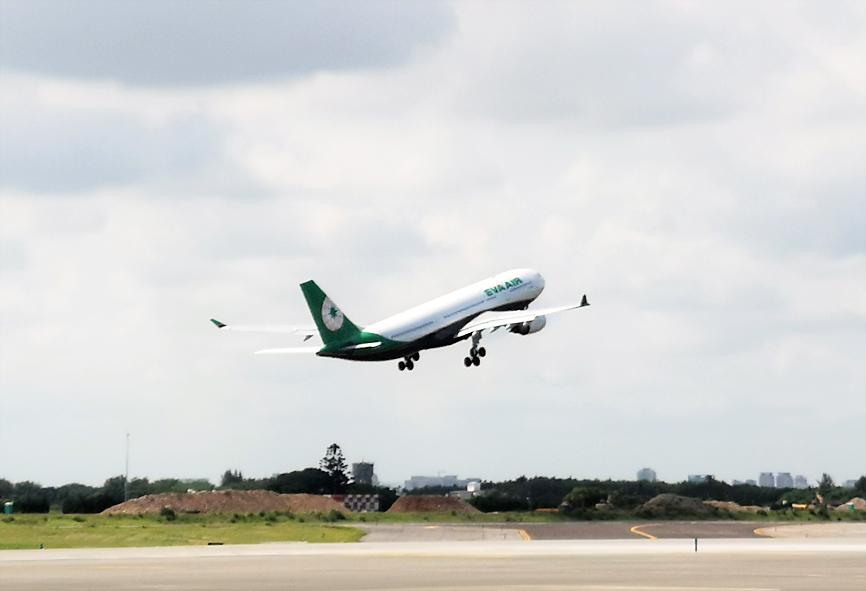EVA Airways Corp (長榮航空) yesterday announced that it would begin nonstop flights from Taoyuan to Milan and Munich later this year, marking its first expansion in the European market in 25 years.
Starting on Oct. 25, the airline will operate two flights per week between Taoyuan and Milan, implementing a plan that was scheduled for February 2020, but was suspended due to the COVID-19 pandemic and the consequent lockdowns across the world.
The airline will also launch four weekly flights to Munich, Germany, on Nov. 3, it said.

Photo courtesy of Taiwan Taoyuan International Airport
The schedules for the two flights will cater to in-transit passengers, as they will arrive in Taiwan early in the morning, allowing for connections onward to northeast and southeast Asia, the airline said, adding that it will use its Boeing Co 777-300ER aircraft on both routes.
With the addition of the Milan and Munich routes, the airline said it would be expanding its service in the European market for the first time in 25 years and creating a more comprehensive flight network.
The airline currently offers nonstop European flights from Taoyuan to Paris and Vienna. It also operates direct flights to London and Amsterdam, with one stop in Bangkok.
Separately, Starlux Airlines Co (星宇航空) yesterday said it plans to recruit 48 Japanese crew members as part of its efforts to meet high air travel demand to north Asia and expand its presence in Japan, chief executive officer Glenn Chai (翟健華) said.
Starlux said Japanese nationals from across the globe, regardless of their gender or experience, are welcome to apply for an interview on its Web site from now through July 26, as long as they hold a college diploma certified by the Japanese Ministry of Education and an English aptitude certificate.
Applicants will first undergo an online interview in English, with those who qualify to have an in-person interview in Tokyo slated for September, before undertaking a physical examination, the airline said in a statement.
After completing three to four months of ground and in-flight training starting in February next year in Taoyuan, crew members will be based in Tokyo and serve on flights between Taiwan and Japan, it said.

SEEKING CLARITY: Washington should not adopt measures that create uncertainties for ‘existing semiconductor investments,’ TSMC said referring to its US$165 billion in the US Taiwan Semiconductor Manufacturing Co (TSMC, 台積電) told the US that any future tariffs on Taiwanese semiconductors could reduce demand for chips and derail its pledge to increase its investment in Arizona. “New import restrictions could jeopardize current US leadership in the competitive technology industry and create uncertainties for many committed semiconductor capital projects in the US, including TSMC Arizona’s significant investment plan in Phoenix,” the chipmaker wrote in a letter to the US Department of Commerce. TSMC issued the warning in response to a solicitation for comments by the department on a possible tariff on semiconductor imports by US President Donald Trump’s

The government has launched a three-pronged strategy to attract local and international talent, aiming to position Taiwan as a new global hub following Nvidia Corp’s announcement that it has chosen Taipei as the site of its Taiwan headquarters. Nvidia cofounder and CEO Jensen Huang (黃仁勳) on Monday last week announced during his keynote speech at the Computex trade show in Taipei that the Nvidia Constellation, the company’s planned Taiwan headquarters, would be located in the Beitou-Shilin Technology Park (北投士林科技園區) in Taipei. Huang’s decision to establish a base in Taiwan is “primarily due to Taiwan’s talent pool and its strength in the semiconductor

An earnings report from semiconductor giant and artificial intelligence (AI) bellwether Nvidia Corp takes center stage for Wall Street this week, as stocks hit a speed bump of worries over US federal deficits driving up Treasury yields. US equities pulled back last week after a torrid rally, as investors turned their attention to tax and spending legislation poised to swell the US government’s US$36 trillion in debt. Long-dated US Treasury yields rose amid the fiscal worries, with the 30-year yield topping 5 percent and hitting its highest level since late 2023. Stocks were dealt another blow on Friday when US President Donald

UNCERTAINTY: Investors remain worried that trade negotiations with Washington could go poorly, given Trump’s inconsistency on tariffs in his second term, experts said The consumer confidence index this month fell for a ninth consecutive month to its lowest level in 13 months, as global trade uncertainties and tariff risks cloud Taiwan’s economic outlook, a survey released yesterday by National Central University found. The biggest decline came from the timing for stock investments, which plunged 11.82 points to 26.82, underscoring bleak investor confidence, it said. “Although the TAIEX reclaimed the 21,000-point mark after the US and China agreed to bury the hatchet for 90 days, investors remain worried that the situation would turn sour later,” said Dachrahn Wu (吳大任), director of the university’s Research Center for